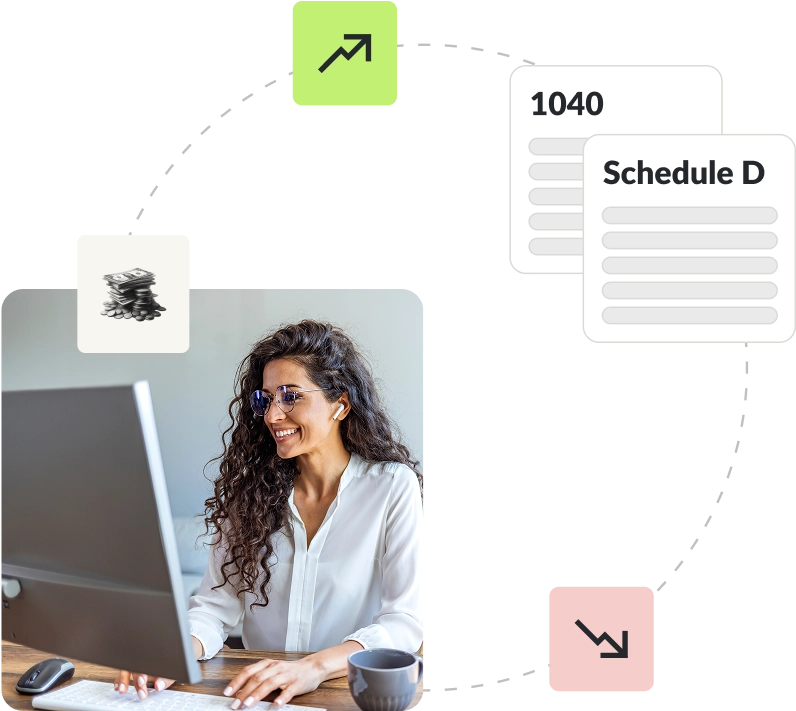2025 Idaho State Tax Deadlines
Idaho Individual income tax filing deadlines and extensions for 2025.
If you are a resident or have been involved in business operations within Idaho, you might be required to file Idaho State taxes. Idaho maintains a progressive income tax system with a top rate of 5.695% (reduced from 5.8% in 2024), making it one of the more moderate State tax environments. This comprehensive guide outlines the key tax deadlines and considerations applicable to Idaho in 2025.
Idaho business tax deadlines for 2025
C Corporation deadlines and requirements
C Corporations in Idaho must file and pay Corporate Income Taxes by April 15, 2026.
Filing requirements include:
- Complete Form 41 (Idaho Corporation Income Tax Return)
- File online through the Idaho State Tax Commission's online services
- File by mail must be postmarked by the due date
- Payment must be made by April 15, 2026
Extension to file taxes in Idaho for 2025
The Extension Deadline for Idaho corporate income tax returns is October 15, 2026. Idaho automatically grants a six-month extension on filing corporate income tax returns without requiring separate forms. This is an extension to FILE, not an extension to PAY—payment is still due April 15, 2026.
Pass-through entities
Idaho S Corporation and Partnership tax deadlines for 2025
S Corporations and Partnerships must file in Idaho by April 15, 2026.
Required forms include:
- Form 65 – Idaho S Corporation Income Tax Return
- Form 65 – Idaho Partnership Return of Income
Extension to file S Corporation and Partnership taxes in Idaho for 2025
The Extension Deadline for Idaho S Corporations and Partnerships returns is October 15, 2026. Idaho automatically grants a six-month extension on filing pass-through entity tax returns without requiring separate applications. This is an extension to FILE, not an extension to PAY—payment is still due April 15, 2026.
Idaho individual tax considerations for 2025
Filing requirements and income thresholds
Idaho Individuals must file a State income tax return if they are required to file a federal return or if their Idaho income exceeds specific thresholds.
The general rule is that you must file if your Idaho adjusted gross income exceeds:
- $12,200 for single taxpayers
- $24,400 for married filing jointly
- $18,350 for head of household filers
- $12,200 for married filing separately
Estimated tax deadline for Idaho 2025
Estimated tax payments are due:
- April 15, 2025
- June 15, 2025
- September 15, 2025
- January 15, 2026
Who must make estimated payments
You must make Idaho estimated income tax payments during 2025 if you expect to owe $500 or more in Idaho income tax after subtracting your withholding and credits. Individuals with business income, rental properties, or retirement distributions typically need to make quarterly payments.
Individual tax deadline for Idaho 2025
You must file and pay Individual Income Taxes in Idaho by April 15, 2026. Idaho accepts electronic filing through the Idaho State Tax Commission's online system, significantly reducing processing time.
Available forms include:
- Form 40 – Idaho Individual Income Tax Return
- Form 43 – Idaho Part-Year Resident and Nonresident Individual Income Tax Return
Extension to file taxes in Idaho for 2025
The Extension Deadline is October 15, 2026, to file your Idaho Individual Income tax return. Idaho automatically grants a six-month extension on filing personal income taxes without requiring separate State extension forms. This is an extension to FILE, not an extension to PAY—payment is still due April 15, 2026.
What Idaho tax professionals need to know
Several key considerations make Idaho's tax landscape unique for 2025:
Idaho's recent tax rate reduction from 5.8% to 5.695% demonstrates the State's commitment to maintaining competitive tax rates. The State offers various tax credits, including credits for child and dependent care expenses and contributions to educational savings programs.
Electronic filing requirements
Idaho encourages electronic filing for most taxpayers:
- C Corporations can file electronically through Idaho's online services
- Partnerships and S Corporations benefit from faster processing through electronic systems
- Individuals can use Idaho's online filing system for free electronic filing
How does Idaho determine residency
Idaho determines residency based on domicile—your permanent home and the place you intend to return. Full-year residents pay tax on all income regardless of source, while part-year residents and nonresidents pay tax only on Idaho-source income.
Idaho's unique tax features for 2025
Recent tax rate reduction
Idaho reduced its top individual and corporate income tax rates from 5.8% to 5.695% effective January 1, 2024, with this rate continuing into 2025, demonstrating the State's commitment to tax competitiveness.
C Corporation rate alignment
C Corporations in Idaho benefit from the same 5.695% rate reduction, creating alignment between individual and corporate tax rates.
Grocery tax credit
Idaho provides a grocery tax credit to help offset sales tax on food purchases, benefiting Individuals across all income levels with this refundable credit.
Agricultural exemptions
Idaho offers various agricultural exemptions and credits, supporting the State's significant farming and ranching industries through preferential tax treatment for qualifying agricultural activities.
Sources
Don't miss State tax deadlines – Join Instead
State tax deadlines are approaching fast. While you're scrambling to gather documents and figure out complex deductions, you could be missing thousands in potential savings.
Instead's AI-driven platform does the heavy lifting for you—automatically identifying tax strategies, monitoring your accounts for savings opportunities, and ensuring you claim every deduction to which you're entitled. No more guesswork, no more missed opportunities.
The material discussed on this page is meant for general illustration and/or informational purposes only and is not to be construed as investment, tax, or legal advice. You must exercise your own independent professional judgment, recognizing that advice should not be based on unreasonable factual or legal assumptions or unreasonably rely upon representations of the client or others. Further, any advice you provide in connection with tax return preparation must comply in full with the requirements of IRS Circular 230.
Please note that if any due date falls on a federal or state holiday or weekend, it may be adjusted to the next business day. Always verify current deadlines with the appropriate tax professional and authorities.
Looking for a different year?

























